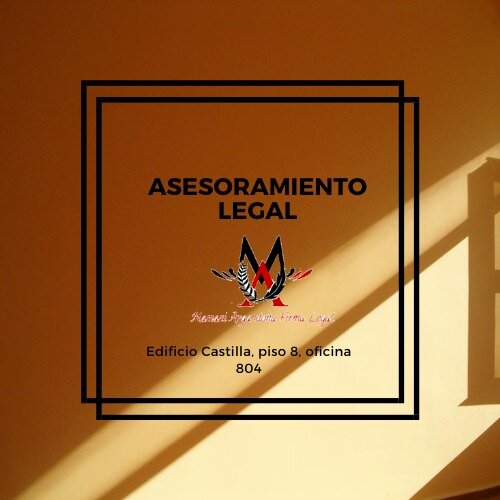Best ESG Advisory & Compliance Lawyers in La Paz
Share your needs with us, get contacted by law firms.
Free. Takes 2 min.
List of the best lawyers in La Paz, Bolivia
About ESG Advisory & Compliance Law in La Paz, Bolivia
ESG Advisory & Compliance refers to the legal and advisory services that help businesses and organizations adhere to Environmental, Social, and Governance (ESG) standards. In La Paz, Bolivia, ESG is an increasingly important aspect of local and international business operations. Companies are expected to conduct their activities with sustainability, corporate responsibility, and ethical governance in mind. This is not only vital for business reputation, but it is also becoming a matter of compliance with local regulations and best practices. Legal professionals specializing in ESG Advisory & Compliance guide organizations through complex local, national, and global requirements, helping them align their operations with evolving expectations and regulations in Bolivia.
Why You May Need a Lawyer
There are several situations where legal help with ESG Advisory & Compliance is necessary in La Paz, Bolivia. Businesses that operate in sectors with environmental impact, such as agriculture, mining, and manufacturing, often require legal advice to comply with environmental laws and standards. Companies seeking international investment or trade must also ensure their ESG practices meet both local and global expectations. Legal issues can arise with community relations, labor practices, anti-corruption measures, and governance structures. Lawyers help navigate regulatory changes, manage risk, structure due diligence, and respond to audits or investigations. If your organization is facing challenges related to environmental compliance, social responsibility obligations, corporate governance matters, or stakeholder engagements, an ESG lawyer can provide invaluable support and guidance.
Local Laws Overview
Bolivia has enacted laws and regulations that directly affect ESG compliance. Environmental protection laws regulate emissions, waste management, resource extraction, and biodiversity conservation. Social compliance overlaps with labor laws, community consultation requirements, and indigenous rights as recognized by the national Constitution and specific statutes. Governance obligations include anti-corruption laws, corporate transparency measures, and specific regulations for sectors such as finance, energy, and mining. La Paz, as the administrative center of Bolivia, houses key regulatory agencies responsible for enforcing these laws. Local businesses must be aware of both municipal ordinances and national regulations, while foreign investors face additional compliance scrutiny, especially in high-impact sectors. The legal landscape is complex and subject to frequent updates, making professional legal advice essential.
Frequently Asked Questions
What is ESG and why is it important in Bolivia?
ESG stands for Environmental, Social, and Governance, three central factors in measuring a business’s sustainability and social impact. In Bolivia, these factors are critical because of strong environmental protections, indigenous rights, and increasing requirements for corporate transparency and responsibility.
Do Bolivian companies have ESG reporting requirements?
Some industries and publicly traded companies must report on specific environmental, social, and governance matters, particularly those with foreign investment or international trade ties. Reporting obligations are growing as Bolivia updates its legal frameworks.
What environmental laws apply to businesses in La Paz?
Key laws cover pollution control, waste management, natural resource use, and water rights. Companies may need environmental licenses, conduct environmental impact assessments, and comply with biodiversity preservation orders.
How are indigenous rights connected to ESG compliance?
Bolivia’s Constitution and legislation protect indigenous communities and require corporations to consult and consider the social impact of their operations on these groups. Failure to engage properly can lead to significant legal challenges.
Does ESG compliance affect foreign investment?
Yes, foreign investors are increasingly required to demonstrate ESG alignment, both for local legal compliance and to meet international expectations of responsible investment.
What are the penalties for non-compliance with ESG laws?
Penalties may include fines, suspension of business licenses, revocation of environmental permits, reputational damage, and even criminal charges in severe cases of environmental harm or corruption.
What is the role of corporate governance in ESG?
Corporate governance ensures transparent, ethical, and legal business operations. It involves risk management, board oversight, anti-corruption measures, and financial disclosures, all crucial for ESG compliance.
Who enforces ESG-related laws in La Paz?
Several government bodies oversee ESG areas, such as the Ministry of Environment and Water, Ministry of Labor, and the Financial System Supervisory Authority, among others responsible for sector-specific regulation.
How can a lawyer help with an ESG audit or investigation?
Lawyers guide organizations in preparing for audits, responding to government inquiries, managing documents, ensuring correct procedures are followed, and representing clients in administrative or legal proceedings if needed.
Can ESG compliance improve access to markets and capital?
Yes, organizations with strong ESG records often find it easier to attract investment, satisfy international partners, and access new markets thanks to enhanced reputation and reduced legal risk.
Additional Resources
For further information on ESG Advisory & Compliance in La Paz, consider contacting or consulting:
- The Ministry of Environment and Water (Ministerio de Medio Ambiente y Agua)
- The Bolivian Ministry of Labor, Employment and Social Welfare
- The Financial System Supervisory Authority (ASFI)
- Standing Committee of Indigenous Peoples
- Bolivian Chamber of Commerce and Industry
- Professional legal associations in La Paz
Next Steps
If you require legal assistance with ESG Advisory & Compliance in La Paz, it is advisable to:
- Identify the specific ESG issue or compliance requirement your business faces
- Gather relevant documents such as environmental permits, internal policies, or recent audit findings
- Contact a lawyer or law firm experienced in ESG matters in Bolivia
- Schedule a consultation to discuss your legal needs and determine the best way forward
- Stay informed about new regulations and make ESG compliance part of ongoing business strategy
Lawzana helps you find the best lawyers and law firms in La Paz through a curated and pre-screened list of qualified legal professionals. Our platform offers rankings and detailed profiles of attorneys and law firms, allowing you to compare based on practice areas, including ESG Advisory & Compliance, experience, and client feedback.
Each profile includes a description of the firm's areas of practice, client reviews, team members and partners, year of establishment, spoken languages, office locations, contact information, social media presence, and any published articles or resources. Most firms on our platform speak English and are experienced in both local and international legal matters.
Get a quote from top-rated law firms in La Paz, Bolivia — quickly, securely, and without unnecessary hassle.
Disclaimer:
The information provided on this page is for general informational purposes only and does not constitute legal advice. While we strive to ensure the accuracy and relevance of the content, legal information may change over time, and interpretations of the law can vary. You should always consult with a qualified legal professional for advice specific to your situation.
We disclaim all liability for actions taken or not taken based on the content of this page. If you believe any information is incorrect or outdated, please contact us, and we will review and update it where appropriate.









